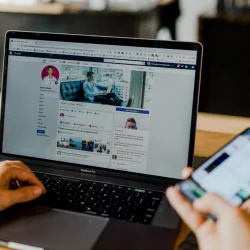VPN vs. Proxy: Key Differences and How To Choose

As you aim to enhance your online privacy and security, you may consider tools like VPNs (virtual private networks) and proxies. But what's the difference between the two? While VPNs and proxies share some functionality, they work differently and have distinct use cases.
How Does a VPN Work?
A VPN creates an encrypted tunnel between your device and a remote server operated by the VPN service. All your online traffic is routed through this tunnel, hiding your IP address and location. This prevents snooping on public WiFi and allows accessing restricted content. VPN encryption secures your data from prying eyes. Leading VPNs use protocols like OpenVPN and IKEv2. Most offer a range of server locations to choose from for optimal speed or to access geo-blocked sites. VPNs require client software on your device.
How Does a Proxy Work?
A proxy acts as an intermediary between your device and the wider internet. When you connect through a proxy server, it fetches resources for you, and websites see the IP address of the proxy rather than your real IP address. This allows bypassing filters and censors, but typically doesn’t encrypt traffic. Proxies also rely on your browser security settings. Types of proxies include transparent, forward, reverse, shared and dedicated proxies. Proxy servers are often free public ones, but can also be commercial services.
Main Differences Between VPNs and Proxies
Encryption - VPNs provide full encryption for all your traffic. Proxies have no inherent encryption unless tunneling protocols like HTTPS, TLS or SSL are used.
Anonymity – VPNs offer greater anonymity as all traffic looks like it’s coming from the VPN server IP address. Proxy IP addresses are shared by multiple users.
Access Restrictions - VPNs are better at evading geographic content blocks but proxies can bypass some workplace and school restrictions.
Speed - Proxies tend to be faster than VPNs which can slow some connections, but VPN speeds are improving.
Cost – Shared proxies are generally free or very cheap, while reliable paid VPNs cost more for full features.
Ease of Use – VPN clients are quick to set up with little configuration needed. Proxies require more setup like manual browser configuration.
When to Use a VPN
Online Privacy – VPNs keep your web browsing, location, traffic, and data private from your ISP and the sites you visit. This prevents profiling for ads and stops data collection.
Public WiFi Security – VPN encryption protects your devices and accounts when on open/unsecured public networks.
Remote Work Access – VPNs allow remote workers to securely access company internal networks, servers, and files.
Unblocking Geo-Restricted Sites and Content – Connecting through VPN servers in other countries lets you bypass location-based content blocking.
Torrenting – VPNs hide your IP address during P2P activity to avoid copyright violation notices.
Access Censored Sites – VPN tunneling gets around government censorship to access sites like social media. For example, you can use VPN to bypass Bitchute ban or use VPN to visit F1 tv pro. Many people in China use VPN to access blocked sites in China.
When to Use a Proxy
Basic Anonymity – Proxies hide your originating IP address from sites you visit, providing minimal anonymity.
Access Restricted Networks – Proxy tools get around strict networks or firewalls blocking certain sites, like in schools.
Location Spoofing – Making your traffic appear to come from a different country by connecting through proxy servers there.
Ad/Cookie Tracking Avoidance – Proxy use can avoid persistent ad and cookie tracking by hiding your IP.
Cost Savings – Shared public proxies are low cost or free if you only need basic IP address masking.
Lightweight Mobile Usage – Proxying may provide enough privacy benefits without VPN overhead on limited mobile data.
VPN vs. Proxy: Frequently Asked Questions

What's faster, VPN or proxy?
In most cases, proxies will provide faster speeds than VPNs. Because VPNs route all your traffic through an encrypted tunnel, it adds overhead that can slow connections, especially on mobile devices. Proxies have less impact on speeds but lack encryption.
Do VPNs and proxies both hide your IP address?
Yes, both VPNs and proxies mask your real IP address from websites you visit by routing your traffic through an intermediary server. However, VPNs provide greater privacy as all traffic looks like it's coming from the VPN server, while proxy IP addresses are shared.
Can you combine VPN and proxy for extra security?
Yes, using a VPN and proxy together can provide additional benefits. The VPN delivers encryption while the proxy offers an extra layer of IP address masking and access capabilities. This combo approach is commonly used for torrenting.
Are mobile VPNs and proxies necessary?
It depends on your mobile usage. Mobile VPNs secure public WiFi access, provide privacy, and get around geo-blocks on cellular. Mobile proxies enable bypassing some network restrictions. Both drain device battery life. For light use, proxies may suffice but VPNs provide robust mobile protection.
What activities are better over VPN versus proxy?
VPNs excel at providing full encryption for privacy during general web browsing, securing public WiFi connections, accessing region-restricted content, and torrenting. Proxies are preferable for basic access bypassing of school and workplace restrictions or spoofing locations.
Do I really need a VPN or proxy?
If you regularly use public WiFi, want to access geo-blocked content, or are concerned about online privacy, a VPN should be strongly considered. Proxies work for light privacy needs or tweaking location access. For most users, VPNs deliver the best blend of security, privacy, and versality.
Conclusion
In general, VPNs provide more complete privacy, security and anonymous browsing capabilities through full encryption and tunneling. But proxies still serve niche purposes like basic access restriction bypassing or location spoofing. For most users who prioritize online privacy and security, a quality VPN is the best option over relying solely on proxies. Consider combining VPN and proxy tools to maximize both privacy and access capabilities as needed.
As threats to online privacy and safety grow, understanding the nuances between VPNs vs. proxies helps you pick the right solution for your browsing needs. Both can be useful but VPNs deliver the most comprehensive protection for daily internet use.
More to Read:
Previous Posts:






